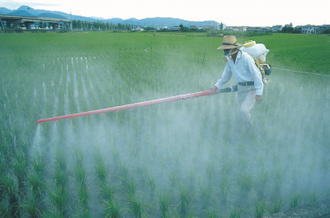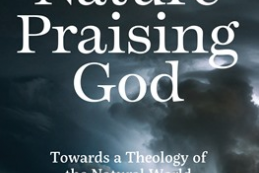World Environment Day: We must address diminishing Biodiversity

Image: Operation Noah
In advance of World Environment Day on 5 June, Laudato Si' Animator Virginia Bell flags up the issue of collapsing biodiversity and action that can be taken to tackle it.
In the BBC film 'Extinction: The Facts' , released in 2020 and narrated by David Attenborough, he says: "It has never been more important for us to understand the effects of biodiversity loss, of how it is that we ourselves are responsible for it," and he warns that, "only if we do that will we have any hope of averting disaster." In the film, scientists list the five main drivers of loss of biodiversity as: Cocoa / Coffee / Palm Oil / Beef / and Soy for livestock feed (poultry, pigs, dairy cows, beef cows, farmed fish). We have to reduce our dependence on these monoculture cash crops. Forests are cut down and natural habitats cleared to grow a single crop. All wildlife is driven off and chemical sprays are used. We need to change our models of production and consumption because they are not sustainable. We also need to change our economic model, presently based on supplying a demand regardless of consequences.
The causes of loss of biodiversity - the variety of life on Earth - are all human related. We kill animals for the wildlife trade and use sea fishing practices which kill many species apart from the target species. Human consumption of the world's resources, way beyond meeting basic needs, is a key drain on the natural world. Climate change causes fires, floods, and displacements; for instance, three billion animals were killed or displaced by the Australian forest fires of 2019-20. Pollution from industrial farming, destructive mining and other businesses poisons land and rivers. Destruction of habitats is widespread, with 75 million hectares of rainforests cut down every year. 75% of unfrozen land has been converted for human use, with the result that 60% of all the mammals on earth are livestock, 36% are humans and only 4% are wild.
Let's look at some drivers of biodiversity loss. Cocoa means chocolate and giving up chocolate may be very difficult for some people. But cutting down is well worth considering. And we can be discerning about the brands of chocolate we choose. 'Ethical Consumer' explains the issues in more detail. Fairtrade and Rainbow Alliance certification do help but are not enough on their own. Opt for vegan and organic as well, for the best guarantee of being environmentally friendly. 'Ethical Consumer' has a list of 97 chocolate brands which are given a score of between 0 and 20 for ethical standards.
Cutting out coffee or cutting down on the amount of coffee we consume is ideal. Switching to a more sustainable brand will also help. Here are four brands that seem particularly ethical and green, are organic and support the farmers and the environment:
Cafedirect - sold in many shops
Equal Exchange - sold in a variety of shops
Source Climate Change Coffee - sold by Ocado, Planet Organic and Holland & Barrett
Clipper - Sold in Waitrose, Asda, Sainsbury's, Tesco etc.
Other eco-friendly brands are Bird & Wild, Grumpy Mule, CRU Kafe and Lost Sheep.
Palm oil seems to be in everything. Actually, it's only in half of everything! It is said to be found in 50% of supermarket products, from food to cleaners to cosmetics. Palm oil is a very efficient crop compared to other oils, but make sure, if you choose to use it, that it is Roundtable on Sustainable Palm Oil (RSPO)-certified, and organic if possible. Certifications such as RSPO and the Forest Stewardship Council cannot be completely depended on, and Fairtrade has limitations, so avoiding palm oil is at the moment a good option to try for. Fortunately, 'Ethical Consumer' lists food items which are palm oil free. At the same site it describes the issues around palm oil, and names stores that either avoid it or sell a sustainable version. Two supermarkets are worth mentioning: Iceland - all their own brand food is palm oil free, and Marks and Spencer - all palm oil used is RSPO certified.
Heavy beef consumption is an issue. We have a great opportunity, as we come out of the pandemic, to transition to sustainable businesses and agriculture. If we grow organic, arable crops instead of beef, we will be able to feed far more people and cause far less destruction and pollution, while using far less resources. So, we will save on energy, land, water and feed. For example, it takes 2,400 gallons of water to produce 1 pound of beef, while producing 1 pound of tofu requires 244 gallons of water, and 1lb of vegetables takes 39 gallons. The saving in resources will be so great that we will even be able to rewild land. Restoring degraded land, rewilding, planting trees and investing in sustainable agriculture and businesses will lead to a strong recovery and less unemployment. We can do our bit by choosing not to eat beef.
Soy feed is another key issue. Soy is fed to chickens, pigs, dairy cows, beef cows, and farmed fish.
It is estimated that 700 - 800 million people are hungry or starving, yet 70 - 80% of the world's Soy crop is fed to farm animals, instead of to humans. Less than 10% is fed directly to humans. Feeding the Soy to animals results in the loss of about 90% of the calories and proteins that the feed contains, giving back only about 10%. It takes a tremendous amount of land and water, to grow this livestock feed, and in the Amazon rainforest land is cut down for this purpose.
If we eat Soy directly and not through livestock, we will be using far less land, water and other resources. So, avoiding eating the livestock that Soy is fed to (chickens, pigs, dairy cows, beef cows, and farmed fish) will help a great deal. Also try to make sure that the soya milk and tofu you buy is from the US or Canada, not from rainforest land, and that it is organic.
Laudato Si' says: "…public pressure has to be exerted in order to bring about decisive political action" (#179). We have to recognise the enormity of the crisis, and act accordingly. Our lifestyle changes should include going vegan, buying organic, buying nothing without questioning the need, and lobbying the powerholders.
Equally important, we need to use our vote to lobby governments to transition away from destructive businesses and agriculture, and towards sustainable businesses and agriculture, using laws, incentives (such as grants) and disincentives (such as taxes). Governments need to change the way they run our economics, to transition from meat, dairy, fish to organic, arable farming, to end polluting businesses, to alter the tax system to help the change to sustainable businesses, to rewild, to reduce waste, to make environmental protection a priority. How can we force the government to do these things? By our vote. Use it to send a clear message to all parties to clean up their act.
Virginia Bell is a Laudato Si' Animator, living in Milton Keynes, Northampton Diocese
LINKS
'Extinction: The Facts', narrated by David Attenborough - www.bbc.co.uk/iplayer/episode/m000mn4n/extinction-the-facts
Ethical Consumer - www.ethicalconsumer.org/
Laudato Si' Movement - https://laudatosimovement.org/


















